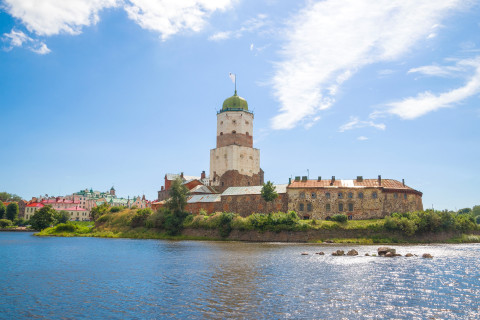In her doctoral dissertation, M.Soc.Sc. Chloe Wells shows that there are both similarities and differences in the ways high school students in Finland frame meanings and memories related to the borderland city of Vyborg, as compared to the way this formerly Finnish and now Russian city is framed in other Finnish discourses. The public examination of Wells' dissertation will take place on Friday 13.11 at 12 noon and will be live streamed here>. The public examination will be in English.
Wells found that the participants in her study, 325 young people aged 16-19 from across Finland, identified as part of an ‘us’ group of young people separate from a ‘them’ group of older people, even older members of their own families, who experienced and/or feel the loss of Finnish Vyborg. This generation gap lead – with some exceptions - to a rejection of strong personal feelings about, or the linking of certain emotions to, the memory of Vyborg’s loss. Wells argues, however, that this rejection may be just one stage in a longer process of ‘coming to terms’ with this past event and its echoes across time as a collectively-felt traumatic loss.
'Ownership' of a borderland place such as Vyborg is complex
In her dissertation Wells shows how, even though participants largely rejected the feelings of loss which may form the background for representations of Finnish Vyborg, they still sometimes thought Vyborg ‘should be’ part of Finland and justified this idea in various ways.
Wells' dissertation highlights that ‘ownership’ of place, especially a borderland place such as Vyborg, a place with a long history and multi-sided belongings, is anything but straightforward. The results of Wells' study shed light on how young people in Finland understand ‘ownership’ of the ‘lost’ place of Finnish Vyborg and where Vyborg ‘belongs’ in their individual and group understandings.
Wells' dissertation addresses a gap in knowledge. Previous studies have often focused on the meanings and memories attached to Vyborg by those Finns forced to leave the Finnish city during World War II. There are no previous studies with young people, the 'third generation', on the meanings and memories they associate with Vyborg.
Using focus groups, Wells worked with 325 high school students (age 16-19) in 11 different cities across Finland to find out the meanings and memories they associate with Vyborg, a city which Finland was forced to cede to the Soviet Union over 50 years before they were born. The cities included in the study were: Helsinki, Imatra, Joensuu, Jyväskylä, Lahti, Lappeenranta, Oulu, Rovaniemi, Turku, Vaasa and Vantaa. Only 7% of participants had ever visited Vyborg.
'Inherited memories' of Finnish Vyborg do not match young people's own experiences
In her dissertation, Wells argues that her research participants - born between 1998 and 2001 - are inheriting meanings and memories which do not 'fit' their own experiences of growing up in Finland. On the one hand young people in Finland today cannot easily or entirely disengage from the meanings and memories that surround them and are being transmitted to them by, for example, older generations. On the other hand they have grown up in a period of more open borders which affords them new ways of thinking about and negotiating previously dominant collective images and stereotypes.
Wells' study adds to understandings of how the meanings and memories associated with a ‘lost place’ are transmitted across time and between generations and how those transmissions are received, understood and expressed.
The doctoral dissertation of MSoc.Sc. Chloe Wells, entitled Vyborg is Y/ours: Meanings and memories of a borderland city amongst young people in Finland, will be examined at the Faculty of Social Sciences and Business Studies. The Opponent in the public examination will be Professor Anna-Kaisa Kuusisto of the University of Tampere and the Custos will be Adjunct Professor Paul Fryer of the University of Eastern Finland.
